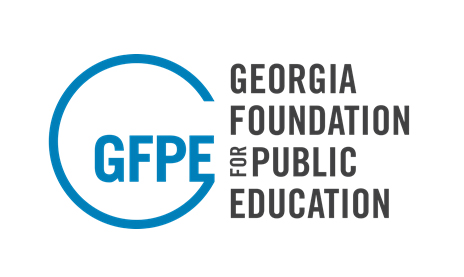
The Georgia Foundation for Public Education (GFPE) is awarding $20,000 grants to five rural school districts to pilot innovative educational programs. The grants are funded by the PEACH Education Tax Credit, which allows individuals and corporations to support public schools and receive a dollar-for-dollar tax credit.
Through its new Rural Education & Innovation Fund (REIF), GFPE invited select school districts located in rural counties (defined as counties with 35,000 or fewer residents) to participate in a three-session workshop series that guided them through the process of developing an innovative program.
Following their participation in the series, districts had the opportunity to apply for up to $20,000 to pilot the program they developed.
Five districts are receiving $20,000 grants through the REIF: Clay County, Crisp County, Dooly County, Macon County, and Sumter County.
“The Georgia Foundation for Public Education is so proud to support these five districts and the innovative projects they have planned to expand educational opportunities for their students,” GFPE Executive Director Paige Pushkin said. “We’re also immensely grateful for the donors to the PEACH Education Tax Credit who made this funding possible. These grants will fund creative, meaningful, and much-needed programs for students in rural Georgia – I can’t wait to see all that is accomplished.”
The grants are funded by the PEACH Education Tax Credit, which allows individuals to donate directly to public education in Georgia and receive a dollar-for-dollar credit on their state income taxes. The tax credit is capped at $5 million and is approved on a first-come, first-served basis. Interested donors can find more information here.
“I am delighted that the Georgia Foundation for Public Education has assisted five rural districts not only in funding, but also in building district capacity to develop innovative programs for their students and staff,” said Dr. Bronwyn Ragan-Martin, the Georgia Department of Education’s Deputy Superintendent for Rural Education and Innovation. “The programs will benefit both schools and communities, and I am excited about GFPE’s dedication to rural Georgia.”
Want to Support Projects Like These? Apply for the PEACH Education Tax Credit
Individuals and corporations can support Georgia’s K-12 public education students at no additional cost to them by securing a PEACH Education Tax Credit. Contributing provides taxpayers with a dollar-for-dollar credit on their Georgia state income taxes, meaning they can apply their tax dollars to support innovation in Georgia’s K-12 public schools. The tax credit is capped at $5 million and is approved on a first-come, first-served basis. Click here for more information and to apply.
2023 Rural Education & Innovation Fund Grantees
Clay County School District ($20,000)
When assessing elementary student data, the Clay County School District noticed a pattern among male students in third through fifth grades: a lack of robust vocabulary usage, which hindered comprehension when reading texts. In response, the district will use its grant funds to implement a mentoring program for third- through fifth-grade boys, recruiting and training male mentors from the local business community to engage the students in reading and interactive group discussion. The district will also purchase age-appropriate books for the mentors and students to read together.
Crisp County Schools ($20,000)
The COVID-19 pandemic led to a mass closure of local early childcare centers in Crisp County, with hundreds of students displaced as a result. To address this lack of a needed resource for families, Crisp County Schools plans to open the Crisp Schools Early Learning Academy (CSELA) at Crisp County Elementary School. The district will use its grant funds to support the new center by providing robust pedagogical training to early childcare learning staff through Cox Campus and the Atlanta Speech School, and hiring high-school students in the Early Childhood Education Pathway to serve as teacher helpers.
Dooly County School System ($20,000)
The Dooly County School System discovered a lack of motivation in its students which has impacted school culture and academics. The district will use its grant funds to revamp its positive behavior and academics reward system for students. Students at the gifted level, those with perfect attendance, and selected “students of the month” will participate in a monthly field trip, visiting a local business or industry to gain career exposure and participating in a cultural experience that will equip them with new knowledge and skills.
Macon County School System ($20,000)
The Macon County School System will implement an intervention for at-risk, rising ninth-grade students. The district will form a committee comprised of instructional coaches, teachers, the school counselor, and an interventionist to select at-risk students based on attendance, behavior, and academic performance. The program will incorporate a STEAM curriculum to encourage interest in academics and a targeted mentoring program through which students will participate in college and industry visits, as well as goal-setting with leaders from the community.
Sumter County Schools ($20,000)
In summer 2023, results of a survey administered by Sumter County Schools revealed that a majority of faculty and staff did not engage in self-care and professional development activities, leading to increased burnout and decreased job satisfaction. The district will use its grant funds to designate a mental health and wellbeing space in each of its five schools. Each space will feature calm lighting, comfortable seating, and exercise equipment along with information about local mental health services, self-care strategies, and relaxation techniques. The district will also partner with the Chattahoochee-Flint Regional Educational Service Agency (RESA) to provide mental health awareness training for faculty and staff.


Chattooga Opinions
The Joy of the Journey: The Importance of Worship

Bulloch Public Safety
SE Ga Road Work: Weekly Traffic Interruption Advisory Through July 4

Bulloch Public Safety
GBI Investigates Child Death in Metter

Bulloch Public Safety
06/09/2025 Booking Report for Bulloch County

Bulloch Public Safety
06/23/2025 Booking Report for Bulloch County

Bulloch Public Safety
06/02/2025 Booking Report for Bulloch County

Bulloch Public Safety
06/16/2025 Booking Report for Bulloch County

Bulloch Public Safety
06/19/2025 Booking Report for Bulloch County






